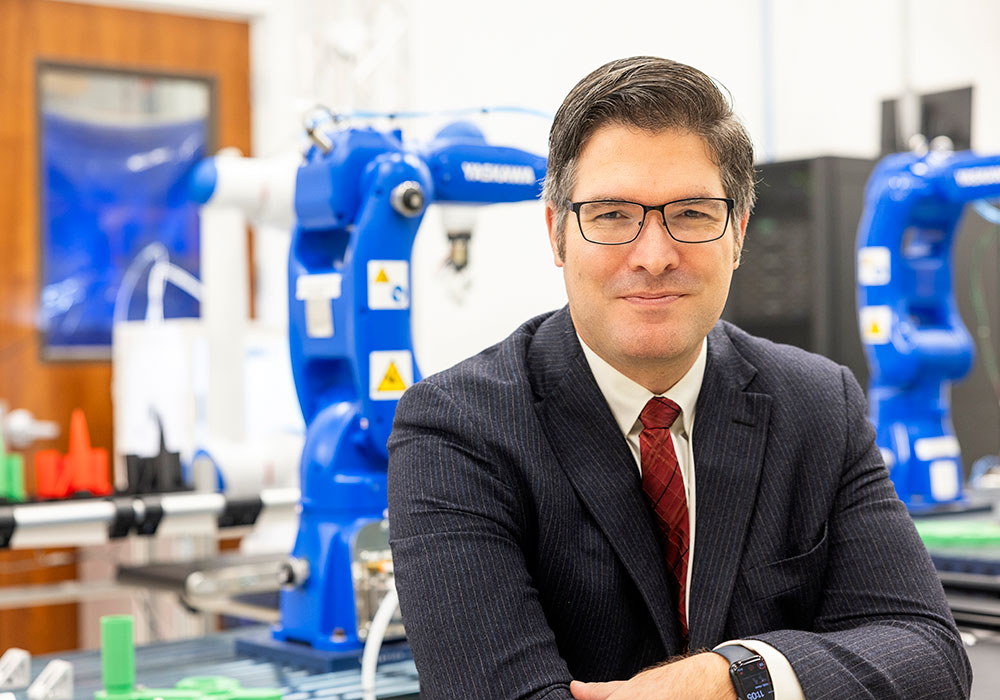Smart factories. Digital twins. The Internet of Things.
If you’ve heard these terms, you might have heard another: Fourth Industrial Revolution. It’s the idea that the Third Industrial Revolution — or Information Age — has given way to an era of highly connected and automated manufacturing facilities. Here, machines talk to each other, sensors monitor operations and AI propels efficiency.
But the dawning of a new era comes with challenges. Modern manufacturers must integrate these new technologies into their factories — and they desperately need a creative workforce that understands how to innovate and use those technologies.
These are the kinds of problems Thorsten “Thor” Wuest seeks to solve. The newly hired Molinaroli College of Engineering and Computing professor is a recognized thought leader in smart manufacturing, the integration of advanced technologies to improve production processes and decision-making. And as South Carolina experiences record manufacturing job growth, Wuest sees an opportunity for the University of South Carolina’s engineering graduates to keep that momentum going.
“One factor that comes up in every conversation with manufacturers is we need skilled and qualified workers. We need a steady supply, not just two or three,” Wuest says. “Supplying qualified workers is crucial to attracting the next investment, the next factory, the next supplier that wants to build their facility right here in South Carolina instead of Texas.”
Or California. Or Alabama. Or anywhere. Wuest believes he can help South Carolina meet its emerging workforce needs. So does the college, which tapped the professor to lead its new undergraduate industrial engineering program that will launch this fall.
Industrial engineers are the people who make processes more efficient. They can be found just about everywhere — from hospitals to Disney parks to consulting firms — but manufacturing is their bread and butter. The field has significant crossover with business and often attracts students with an entrepreneurial mindset.
That’s one reason the field appealed to Wuest. Born and raised in Germany, he was first exposed to industrial engineering as an officer candidate in the German Army. He received training in logistics, which involved materials handling, supply chain and transportation. Managing these complexities piqued his interest and led to his decision to pursue an industrial engineering degree.
“I thought industrial engineering was somewhere I could develop interests in the technical sciences, building things and business, and venture out into different areas,” he says. “That interdisciplinary approach, I guess, is what drew me to it and still excites me today.”
Until he was midway through his Ph.D. in production engineering at the University of Bremen in Germany, he had every intention of going into industry, possibly as a consultant. But academia, he came to understand, would give him the chance to work with students and cutting-edge technology. More importantly, he could choose what that work looked like and what problems to pursue.
With a new program, you can really start fresh and build on what is needed now, what current graduates will need to be successful.
“That’s when I realized I do enjoy working with motivated students. I do enjoy the freedom of selecting my projects, of selecting the people I work with,” he says. “You have a lot of freedom in academia, which is kind of entrepreneurial. And I work with a lot of startups and entrepreneurs because I like that energy.”
He can feel that energy at USC, where he is helping to build an industrial engineering program that prepares students for careers on the cutting edge.
“A lot of the programs that exist developed over a long period of time, so they’re often a little clunky. That’s not a critique — it’s just an observation,” Wuest says. “With a new program, you can really start fresh and build on what is needed now, what current graduates will need to be successful.”
While much of the groundwork was done before Wuest came to USC from West Virginia University in August, he looks forward to further shaping the program. Next on his to-do list? Filling out the faculty.
“My vision for the program is to really ground it in application, to bring in the industry perspective from the beginning to prepare our graduates for the real world afterwards, to prepare them to be leaders and innovators in their chosen industry,” he says. “I believe that will make it stand out.”
That could mean hiring former C-level executives to work as instructors or professors of practice as well as hiring top researchers. Learning from both will give students the know-how to tackle what’s happening in the industry now and the tools to tackle new problems as the industry evolves.
On the curriculum front, smart manufacturing will be a required course for all industrial engineering majors, something most other programs don’t mandate. And as the program’s curriculum expands over the next few years, there will be opportunities to develop minors and certificates to make graduates more marketable.
Facilities are critical to training engineers, and plans are underway to expand those, too. That includes moving Wuest’s Smart Manufacturing Lab from WVU to USC’s Swearingen Engineering Center. The state-of-the-art system will complement the existing Future Factories Lab, which it has already connected with virtually for a previous project. The state-of-the-art lab infrastructure will allow industrial engineering students to work with industry-grade equipment and technologies, such as programmable logic controllers and a manufacturing execution system.
“I think we have the unique opportunity to build our program with purpose, to tie everything together,” he says. “When we succeed, we’ll have an extremely strong program that puts us on the map and serves our constituents well.”
